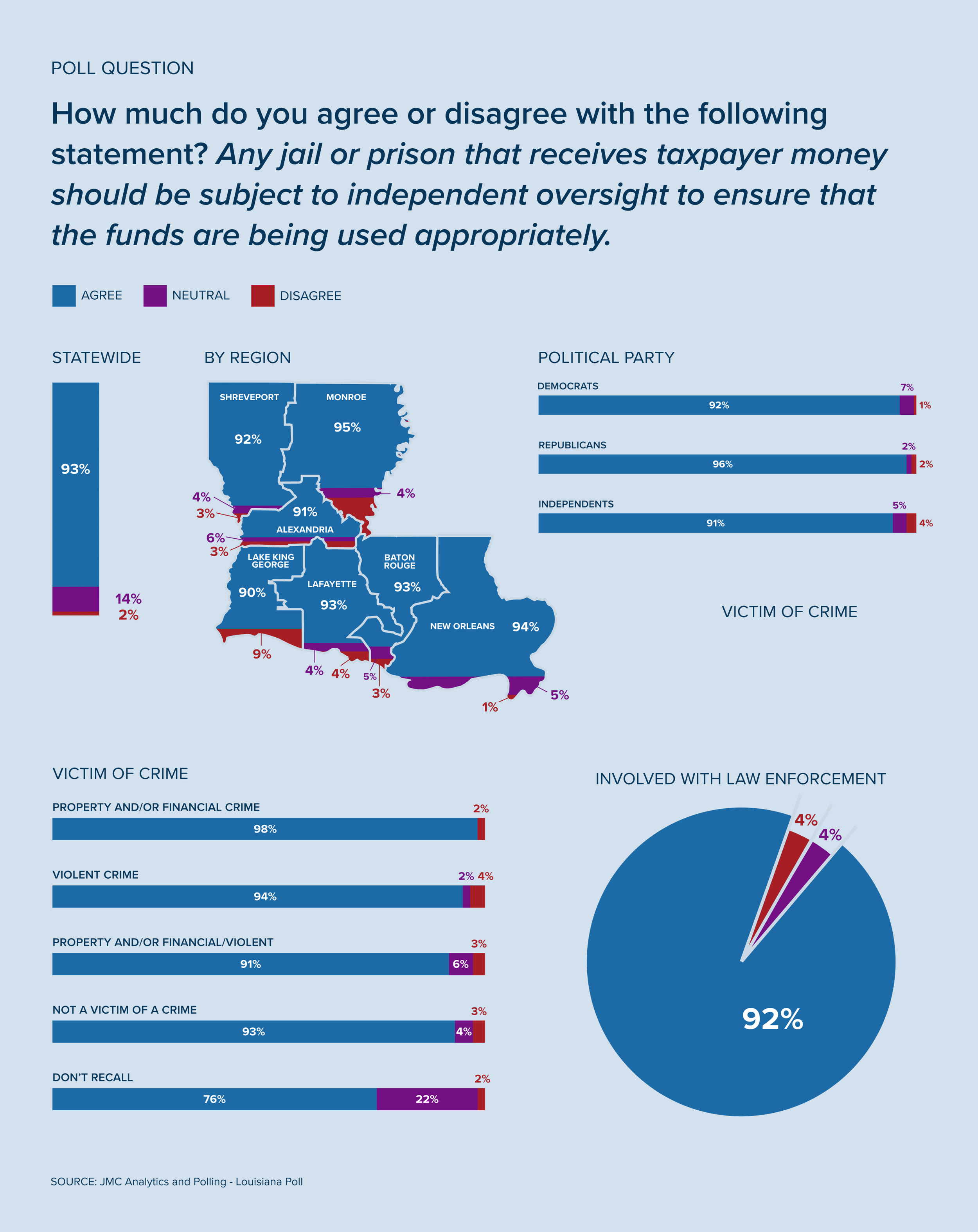Poll: Majority of Louisiana Voters Support Evidence-Based Criminal Justice Reform
A January 2023 poll has shown that while Louisiana voters are concerned about crime, they’re thinking about public safety solutions in nuanced, and evidence-based ways, including support for key criminal justice reform policies aimed at reducing recidivism and using tax dollars efficiently.
The poll, conducted by JMC Analytics and Polling on behalf of the Justice Action Network surveyed more than 600 likely voters throughout the state of Louisiana.
Across all ages, races, political parties and genders, Louisianians cite crime and/or policing as the single most important issue in their state.
Those who are Black (49%), Democrats (43%) or from the New Orleans areas (48%) were most likely to cite crime as the number one issue facing the state, though Republicans (39%) , those who are White (37%), and people from most other regions of the state also rated crime as most important of seven major policy issues.
This also holds true in both law enforcement households and crime victim households. 45% of respondents from a household with someone involved in law enforcement or corrections cited crime as the number one issue, as did 41% of households with someone who had been the victim of a crime.
75% of Lousiana voters say the state's criminal justice system needs major improvements.
With crime top of mind, the vast majority of those surveyed believe Louisiana’s criminal justice system “needs major improvements.” In fact, just 4% of Louisianans think the system “works well as is.”
Louisianans point to social, domestic, and economic issues as the root causes of crime.
When asked what they believe is contributing to the state’s crime problem just nine percent of Louisianans cite recently enacted criminal justice legislation as the biggest factor. Instead, more than half of respondents say social problems related to mental health and substance abuse (34%) or a poor home environment (22%) are contributing most significantly to crime rates, with another 16% saying economic problems related to unemployment are fueling the issue.
What’s more, Louisianans overwhelmingly believe that the system should be fundamentally rehabilitative, rather than punitive.
A majority of conservative voters—and more than three-quarters of crime victim households—agree:
“It does not matter whether a person convicted of a nonviolent crime serves a longer sentence. What matters most is that when they complete their time, they are less likely to reoffend.” - 70% of Louisianans
Many voters overwhelmingly agreed that it is more important that someone leave the system less likely to reoffend, than having served a long sentence, including 87% of voters aged 34 and younger.
And Louisianans support for policies that use evidence-based supports to reduce recidivism and increase reentry success do not stop there.
When asked if it should be made easier for people who have previously served time in prison to obtain employment, 83% of Louisianians voiced affirmative support.
With regard to specific policies, 77% of Louisianians support “Clean Slate” legislation which would automatically expunge or seal criminal records of people convicted of less serious crimes who have not recidivated for a period of years; including 70% of those who self-identify as “very conservative.”
Louisianians support an array of emerging criminal justice reforms, including independent oversight of jails and prisons, diversion from jail for those with mental health or substance use disorders, and changes to the state’s driver’s license suspension/revocation policy.
Independent oversight of jails and prisons turns up an overwhelming 93% support among all households, with even stronger support — 96% — among Republicans.
Law enforcement households, too, strongly support jail and prison oversight—with only 4 percent in dissent.
Louisianians also support a couple of measures which work to keep people out of the justice system when possible–such as diversion from jail when a person has mental health and/or substance use issues (82%), and prohibitions against driver’s license loss over unpaid fines or fees (58%).
Additionally, 67% of respondents believe that those who are accused of misdemeanor crimes should remain in the community while they await trial. That figure increases to 77% when the class of crimes is narrowed to those considered “minor” such as trespassing or public intoxication, including 84% of households where someone has been a victim of crime and 74% of households where someone works in law enforcement or corrections.

